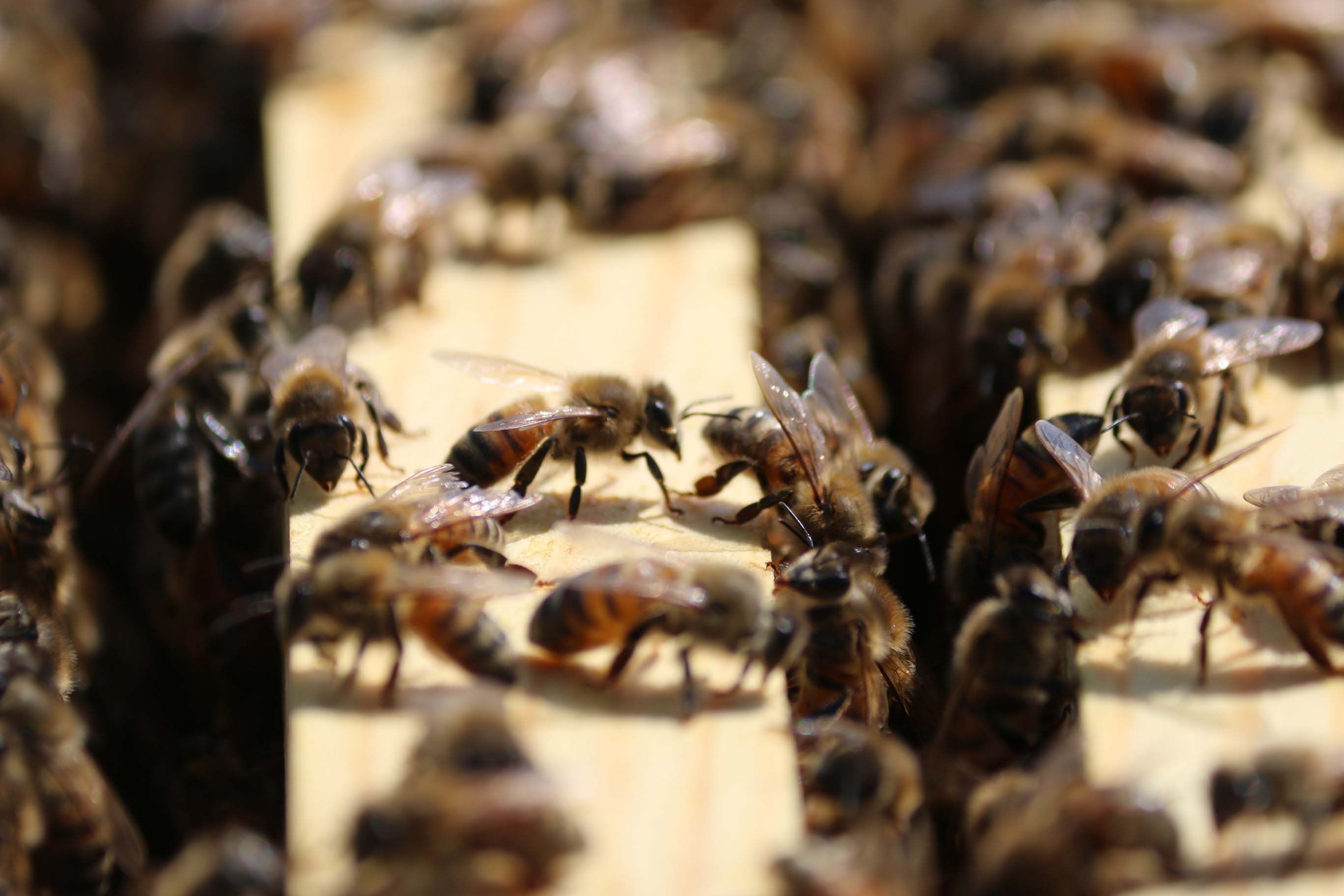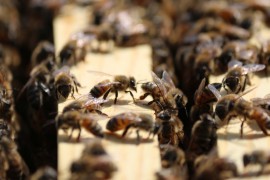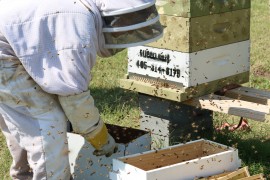To Bee Or Not To Bee: Chemicals, Fertilizer Wreaking Havoc With Bee Population

As autumn settles on Oklahoma, the scenery changes. The heat fades and leaves change into their fall colors.
Wildlife settles in for winter; except for one group.
Bees are preparing their stock of pollen for the winter. During this time, the bees population drops dramatically.
According to Bee Informed, Oklahoma is rated one of the top states with the highest loss of beehives, and bees at a percentage of 63 percent.
If those numbers continue to decrease, a detrimental reduction to crops and livestock are put into place.
When food diminishes, the need for survival begins.

Tonya Wells, a beekeeper and officer of the Central Oklahoma Beekeeper Association, said the only reason we aren’t to the point of putting bees on the endangered species list is because bees produce offspring so many in the spring.
“We have to do what is called ‘splitting the hives,” Wells said.
Wells said they have to split the hives in half and by doing so it helps rebuild the numbers they’ve lost in the winter.
“Thats kind of how we stay ahead from getting it to be too big of a loss,” she said.
Wells is a fifth generation beekeeper, and the first woman in her family to pursue beekeeping. “I was told ‘girls couldn’t be beekeepers,’” she said.
Wells’ grandparents took her cousins [who were all boys], suited them up, and let them see the ins and outs of the hives. Wells would sneak around each time her grandfather took them and watched what they did.
“I was just really interested in it,” she said.

When she got older, Wells moved to Dallas to establish a bee farm.
“Dallas was in an area that wouldn’t have accepted beekeeping by the neighbors,” she said.
Eventually Wells and her husband moved back to Oklahoma. Wells’ looked for an akridge to start their own hives. Her husband wasn’t supportive at first.
So her plan was put on hold.
Wells introduced the idea for hives to her husband a second time when the State Fair revisited Oklahoma.
Inside, the fair had a booth for the Oklahoma Beekeepers Association. A couple days later Wells’ husband was ready to join his wife in establishing their bee farm.
Today, the Wells own Queen Bri’s Honey farm. There, they teach classes for beekeeping, sell honey, and help with bee swarm removal.
Here, they help protect the bee population.
“If people want to really help out with saving the bees, one of the ways they can do that is becoming a beekeeper.” Wells said. “Another thing they can do is plant wildflowers. One of the reasons bees are struggling so much is that we don’t plant cover crops anymore — instead we use fertilizers.”
Wells said instead of wildflowers, farmers have fertilizers. “The fertilizer, which puts in place of having nitrogen rich wild flowers with nectar and pollen for bees to eat, they’ve got the fertilizers and end up cutting crops off and planting another.”
Wells said if people plant wild flowers, particularly if they have four or five acres, it can make a huge difference, and help avoid products like pesticides.
“Pesticides, neonicotinoids is a GMO product. It’s coated or sprayed on,” she said. Wells said the chemicals gets in the system whenever the flower is producing nectar or pollen, then the pesticide leaks out into the nectar, so when bees begin to eat the nectar, they die.
Wells’ concern is a realistic one.
According to members from the Oklahoma Monarch and Pollinator Collaborative, there are over 4,000 native bee species. “Honey bees are not at risk of extinction, though commercial hives have faced significant declines due to a mix of stressors including pesticide exposure and pests,” the organizations said.
The organizations also said non-native honey bees are viewed as a domesticated species resource and are regulated by the Oklahoma Department of Agriculture, Forestry and Food under the Oklahoma Managed Pollinator Protection Plan.
“When we lose a species to extinction, we lose an important piece of biodiversity on this planet that can never be replaced,” the organizations said. “Bees have a direct benefit to humans via pollination services and food that results, as well as to the health of the ecosystems that both humans and wildlife depend on.”
The organizations agreed that in the process that bees and other pollinators fertilize flowers. They transfer from one flower to the next, which benefit the environment.
“Through pollination, bees are responsible for success reproduction in flowering plants. It also allows plants to form the seeds, fruits, berries and nuts that feed both humans and wildlife,” they said.
Without them the organizations said it can have eventually be life threatening without them.
“The extinction of native bees would have a devastating effect on native plant reproduction (which is the base of the ecological food chain), and thus on ecosystems as a whole. There would also be a major impact on agricultural crops, orchards, hay fields and gardens,” they said.
The Oklahoma Monarch, and Pollinator Collaborative said there is more than one pollinator to protect. “Other insects include butterflies, moths, wasps, flies, ants, and beetles. In addition some birds such as hummingbirds.”
Local biologist Katie Shauberger said at the moment, commercial honey bees are endangered to to Colony Collapse Disorder.
“CCD is a relative issue,” Shauberger said, “It can be caused by a variety of pressures including the practices of commercial farming (many bees packed together, traveling far distances, stress) as well as climate change.”
Shauberger said we do not fully understand the importance of biodiversity. “Everything is interconnected in ways that may not be apparent until a piece of the web is gone,” she said. “ I would say that the most obvious importance of bees is our need for them for food but the most important reason we need bees is for their deeper and not fully understood role in our plant dependent world.”
As small as they are, bees and overall pollinators provide a powerful life source to humans day to day lives.
Without bees, human life eventually vanishes.